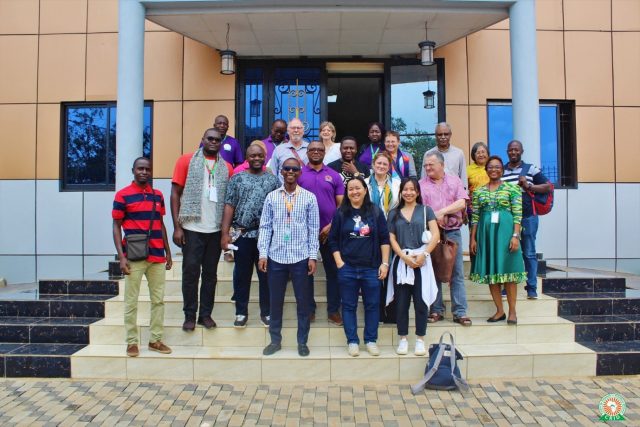
Family picture at CRID
From 13 to 22 March 2023, 22 participants from several institutions including the Imperial College London, London School of Hygiene & Tropical Medicine (LSHTM), Mahidol University, Malaria Consortium, Institut Pierre Richet (IPR), and the Centre for Research in Infectious Diseases (CRID) took part in the Resilience Against Future Threats through Vector Control (RAFT) Annual Scientific Meeting held at Franco Hôtel, Yaoundé, Cameroon. This meeting was financed by LSHTM through the RAFT project.
During the meeting, training sessions were conducted to enhance RAFT’s researchers’ knowledge and skills in experimental hut trials, genetic analysis, characterization of insecticide resistance, and modelling. Emphasis was laid specifically on molecular tools to assess insecticide resistance (phenotypic resistance, genotyping, gene expression for Aedes and Anopheles mosquitoes). Participants of the meeting seized the opportunity to visit CRID premises to get a glimpse of CRID’s research facilities and platforms. They appreciated the equipment commonly used in the molecular biology unit, mosquito rearing, and bioassays process unit in the insectarium and laboratory.
The main objective of this Annual Scientific Meeting was to evaluate the progress of the RAFT consortium in terms of strategy and science, and to ensure that it can achieve its ultimate objective which is to address a range of urgent issues on mosquito-borne diseases, including insecticide resistance and emerging threats by the year 2026. This annual meeting consortium aimed to achieve this objective by reinforcing the understanding of RAFT’s objectives and defining the strategies to achieve them; promoting renewed commitment to these objectives; facilitating collaboration and clarifying on Year 4 outputs and activity plans; strengthening the consortium by fostering a better understanding and dissemination of each partner’s work, and how it contributes to the consortium’s ability to achieve RAFT’s objectives; providing a better understanding of the scientific issues and findings that RAFT is currently addressing and enhancing the knowledge and skills of partner researchers on key topics relevant to RAFT.






